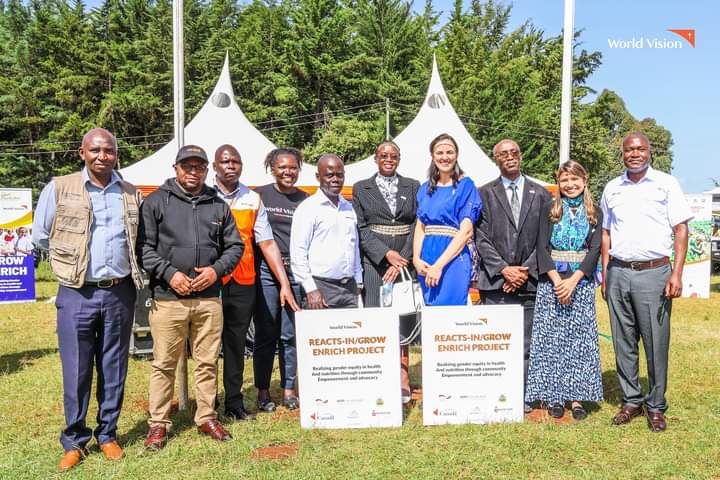In a significant move to combat severe malnutrition and improve maternal and child health in Kenya, World Vision and the Elgeyo Marakwet County Government have launched two transformative health projects aimed at significantly improving maternal and child health and nutrition in the County.
World Vision and partners are advancing a combined investment $6.04 million (Ksh 803.4 million) to impact over one million people in Elgeyo Marakwet County over the next decade through the Global Affairs Canada-funded REACTS IN (Realizing Gender Equality, Attitudinal Change & Transformative Systems in Nutrition) Project and the BMZ-funded Grow ENRICH (Enhancing Nutrition Services to Improve Maternal and Child Health in Africa) Project.
According to the Kenya Demographic Health Survey (KDHS) 2022, in Elgeyo Marakwet, 22% of children under five are stunted, 4.8% are wasted, and 13.9% are underweight, and just 25.5% of children under two receive the minimum dietary diversity required for healthy growth.
These projects are part of World Vision’s broader commitment to combating malnutrition and promoting gender equality in the region.
REACTS IN is a seven-year programme focused on improving nutrition, nutrition-related rights, and gender equality for the most vulnerable women, adolescent girls, and children under five years in Kenya, Somalia, Tanzania, and Bangladesh, while the Grow ENRICH initiative is a four-year project designed to boost maternal and child health and nutrition by strengthening health and nutrition systems and implementing gender-sensitive strategies in Kenya, Somalia, and Tanzania.
The timely projects will also seek to address gender inequality in the indicated regions, and help address challenges such as teenage pregnancy which stands at 12% in Elgeyo Marakwet compared to the national average of 15%; additionally, women in the County face higher rates of physical violence at 30% compared to the national average of 34%, according to KDHS 2022.
Speaking at the launch on Thursday, Elgeyo Marakwet Governor, Wisley Rotich, expressed gratitude to World Vision and partners for the investment, which promises to transform the lives of countless families in the County. “With poverty rates at 46% in Elgeyo Marakwet, higher than the national average, access to food is a significant challenge, leading to alarmingly high malnutrition rates among our children.
Astonishingly, in every 10 children in the County, five are uncertain of their next meal,” Governor Rotich stated, “Through these pivotal projects, we anticipate a major shift that will empower families to access sufficient food and lead more stable lives.”
He added that the projects will also help reduce harmful practices driven by food insecurity and poverty.
World Vision Board Member Dr Anne Kimari said, “Despite extensive efforts worldwide, malnutrition remains a pressing global public health issue. The situation in Elgeyo Marakwet is no different. We have children who are still facing high malnutrition and that is why we are here today,” she said, adding, “Through strong partnerships with Nutrition International, Harvest Plus, McGill University, Anglican Development Services (ADS), Kenya Agricultural Research Organizations (KALRO), the government, and local communities, we will strive to improving nutrition, nutrition-related rights, and gender equality for the poorest women, adolescent girls, and children under five.”
In Sub-Saharan Africa, the prevalence of wasting of children under 5 years was 5.7 % in 2022, while under 5 mortality rates were 73 deaths per 1,000 live births – approximately 3 million in 2021.
In light of these alarming rates of stunting and hunger especially among children, World Vision has committed to focus the next three years on reducing hunger and improving nutrition for 125 million children across 67 countries where they are suffering most, 27 of those countries are in Africa, and 9 are in East Africa, including parts of Kenya, through its ENOUGH campaign, recently launched in Kenya.





